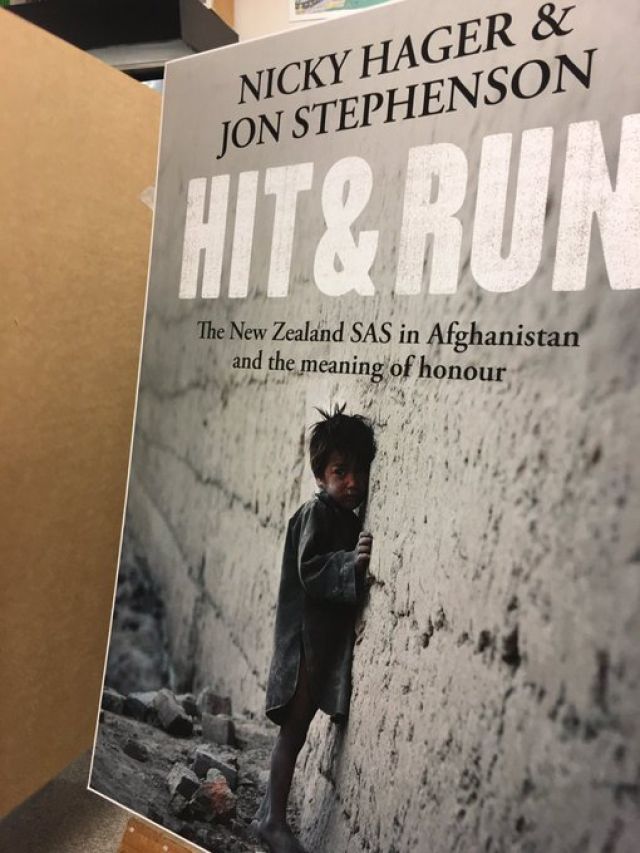
Hit and Run: The New Zealand SAS in Afghanistan & the Meaning of Honour
By Nicky Hager & Jon Stephenson
Potton & Burton, 2017
159 pages
In this well-written and powerful book, Nicky Hager and Jon Stephenson present a barrage of evidence that “New Zealanders and their United States allies were involved in war crimes” in Afghanistan in 2010.
The evidence is gleaned from interviews with over three dozen people. These include the victims of the alleged war crimes, serving and former members of the New Zealand Defence Force (NZDF), serving and former members of the Afghan army and intelligence services, as well as civilian officials, NGO workers, and medical staff.
Most of those from the NZDF and Afghan forces participated directly in the events described in the book. For obvious reasons, they are not identified by name.
On August 3, 2010, Lieutenant Tim O’Donnell became the first NZ military fatality in Afghanistan when he was killed by a roadside bomb while on patrol. Hager and Stephenson allege that 19 days later, on August 22, the NZ Special Air Services (SAS), backed by US Apache helicopters, carried out a in a “revenge” mission.
They attacked the villages of Naik and Khak Khuday Dad in the Tirgiran Valley in Baghlan Province, where the insurgents thought to be responsible for O’Donnell’s death were believed to be staying. But according to the book, the intelligence on which the mission was based was flawed: the insurgents were elsewhere and only unarmed civilians were present in the villages.
In the attack, six civilians were killed (including a three-year-old girl), and 15 further unarmed civilians, mainly women, children and old men, were wounded, in some cases badly. Hager and Stephenson allege that although many casualities were the result of fire from the US helicopters, some were caused by NZ SAS snipers on the ground.
They claim NZ forces did nothing to help the wounded civilians or stop the helicopters attacking them.
The book lays the responsibility with the NZ SAS — which “planned, lobbied for, and executed” the attack — and then-NZ Prime Minister John Key, who gave the decisive authorisation for the raid.
The book says: “Ethically, the actions of the NZDF, the SAS, and the former Prime Minister are surely the moral equivalent of a hit and run driver who hears the bang, knows children could be hurt, looks around to check if anyone has seen them and then drives away.”
Hager and Stephenson make a strong case for an independent investigation of the events surrounding the attacks of August 22. The April 4 Otago Daily Times reported that their call has been echoed by the leader of the NZ Labour Party, Andrew Little, as well as the NZ Green Party, New Zealand First and United Future.
However, NZ Prime Minister Bill English has ruled out an independent inquiry. Based on information received from Lieutenant General Tim Keating, Chief of the NZDF, English said there was no evidence of civilian casualties to warrant an investigation.
According to an April 3 Newshub report, English said that Keating is independent, as “he wasn’t involved in the operation”. English’s claim is unlikely to convince many, given Keating is a former commander of the SAS.
Hager and Stephenson also explicitly include Keating, who was Deputy Chief of Army in 2010, in the list of senior army officers who should be required to present evidence to the proposed independent inquiry.
Since the publication of Hit and Run in March, much has been made of a small error in the map included in the book, in which the villages of Naik and Khak Khuday Dad are mislocated by around two kilometres.
In an April 5 interview with Vice.Com, Hager said this minor inaccuracy was due to the “untracked, roadless and mapless” nature of the terrain and that it does nothing to undermine the central allegations made in the book about attacks on unarmed civilians.
Looking at the wealth of eyewitness testimony Hager and Stephenson provide, it is hard to disagree that an independent inquiry is necessary. And the stakes are high.
As one former military officer quoted in the book puts it: “Unless war crimes that occur in secret are investigated properly, they are likely to recur again and again.”